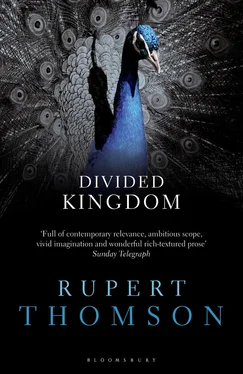The wind lifted and hurled itself against the tall windows. Above our heads the chandeliers shuddered and shook like glass birds ruffling their feathers. I thought of Cody waiting in the draughty corridor outside and wondered whether he was beginning to wish that he had held his tongue.
There were four humours, Miss Groves explained, and each humour could be matched to a different personality or character. She drifted towards the blackboard again. Under YELLOW BILE she wrote CHOLERIC, under BLACK BILE she wrote MELANCHOLIC, under PHLEGM, PHLEGMATIC, and under BLOOD, SANGUINE. Difficult words, she said, turning back to us, but not so difficult to understand. Choleric people were known for their aggressive qualities. They led lives packed with action and excess. Melancholic people, by contrast, were morbid and introspective. What interested them was the life of the mind. Phlegmatic people were swayed by feeling. Empathy came naturally to them, as did a certain spirituality, but they tended to be passive, a little sluggish. As for sanguine people, they were optimistic, good-humoured and well-meaning. They were often held up as an inspiration to others. Miss Groves’s eyes swept over our faces. ‘Do you see where this is going?’ she said. ‘No, not yet, perhaps. But you will — you will.’ And she smiled knowingly.
That night, in the bathroom, Cody showed us the backs of his thighs. The skin was striped with livid weals where Miss Grove’s cane had landed, but he had no regrets. Rather, he seemed to view the punishment as the price he had paid for some valuable information, which he was now in a position to pass on.
‘When she beats you she sort of grunts,’ he said, ‘just like a sow.’
During the next few days Miss Groves gave us the rest of the story. Everyone in the country had been secretly examined, assessed and classified, all in strict accordance with the humours. As categories, they were only approximate at best, and there had been injustices, of course there had, but that could not be helped. At this point she had stepped forwards again, her eyes seemingly lit from the inside, like lamps. In times of crisis, she said, the good of the many always outweighed the misfortunes of a few, especially when the health of an entire nation was at stake.
Once the population had been split into four groups, the land was divided to accommodate them. What had been until then a united kingdom was broken down into four separate and autonomous republics. New borders were created. New infrastructures too. New loyalties.
‘All this is going on,’ Miss Groves said, ‘even as we speak,’ and turning to the nearest window, her face took on a kind of radiance.
In her opinion, symbolism would play a crucial role during this transitional phase. People’s lives, both public and private, had been disrupted. They had to be given something fresh, something clear and powerful, with which they could identify. It had been decided that the countries would be colour-coded. The territory assigned to those with a choleric personality would be known as the Yellow Quarter, choler being associated both with yellow bile and with fire. Since phlegm was allied to water, the home of the phlegmatics was to be the Blue Quarter. Although melancholia originated in black bile, the authorities rejected black as a defining colour. It had too many negative connotations. They drew on the earth instead, which was the melancholy element, and which was generally personified in ancient iconography as a woman in green garments; it was to the Green Quarter, therefore, that melancholic people would belong. As for sanguinity, it derived from blood. The region set aside for those of a sanguine disposition became the Red Quarter.
To strengthen the identity of the four new countries, each had been provided with its own flag. In one of her lighter, more creative moments, Miss Groves invited us to come up with our own versions, based on what we had already learned. A fair-haired boy called Jones won first prize. His design — a flag for the Red Quarter — made use of a magnified photograph of blood, which he’d found in a magazine. The pattern of red and white corpuscles looked industrious and poetic, and it was wonderfully clever too: all sanguine people would carry their national flag inside themselves, whether they liked it or not (so would everybody else, of course, but as Jones quietly pointed out, for them it would be something to aspire to, a goal, a dream).
After the prize-giving, Miss Groves produced examples of the real thing. The choleric flag had a yellow background on which there stood a salamander. According to Aristotle and several other early naturalists, the salamander was believed to live in fire. On the phlegmatics’ flag a sea horse floated on a cobalt ground, the sea horse suggestive of the diffident, the indeterminate, while the melancholic flag showed a rabbit crouching on a field of green, the rabbit being one of the animals used in iconological representations of the earth. The flag that would fly in sanguine territory was a peacock resplendent on a scarlet ground. Those of sanguine temperament were held to be ruled by the air, and Juno, its goddess, was often portrayed in a chariot drawn by peacocks. Though the use of animals appealed to me, especially the mythical salamander, I still thought Jones’s effort outshone everything I’d seen, and I told him so, which made him blush and look away.
In Miss Groves’s final lesson, she returned to her point of departure. A chill wind blew that morning, and the chandeliers shivered and chattered overhead. Untidy scraps of grey cloud flew past the windows. The desk to my immediate right stood empty. Poor Abdul Nazir had been removed from the house some days before.
‘The reason why you are special,’ she said, ‘as I’m sure you will have realised by now, is because you have all been classified as sanguine.’ She raised her voice a little, to combat the moaning of the wind. ‘If you will bear with me, I would just like to read you a short passage from a work that was written more than four hundred years ago.’ Producing a small thick book with a cover of worn brown leather, she cleared her throat and began:
If there were a monarch or prince to be constituted over all temperatures, this sanguine complection should, no doubts, aspire to that hie preheminence of bearing rule; for this is the ornament of the body, the pride of humours, the paragon of complections, the prince of all temperatures. For blood is the oile of the lampe of our life.
Even when she had fallen silent, Miss Groves continued to stare at the page from which she’d read, then she slowly closed the book and let her eyes pass solemnly across our faces. ‘You have been wonderful pupils,’ she said, her voice trembling now, ‘and I have nothing left to teach you. Go out into the world and do your best. I wish you all every success.’ With that, she turned and hurried from the room.
Maclean nudged me, and I looked round. The light shone through his big, translucent ears. ‘A little too much phlegm this morning,’ he said, ‘don’t you think?’
He had learned his lessons well.
Among other things, Miss Groves had taught us that the family had been in serious decline for years, decades even, and it was a measure of people’s conservatism, their fear of change, that the idea had lasted as long as it had. How could people with little or nothing in common be expected to live together? How could they achieve stability, let alone happiness? Anyone with an ounce of common sense could see that it was a recipe for disaster. In short, the family could be held responsible for society’s disintegration, and the politicians who masterminded the Rearrangement had felt compelled to acknowledge the fact. But how to act on it? They soon realised that the answer was already lying on the table in front of them. If they rearranged the population according to the humours, then they would automatically be dismantling one concept of family and establishing another in its place. The new family would be a group of people who shared a psychological affinity — people who got on, in other words. Blood ties would be set aside in favour of simple compatibility, and if that wasn’t a propitious unit on which to base an efficient and harmonious society, Miss Groves had argued, then she would like to know what was.
Читать дальше












